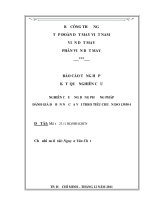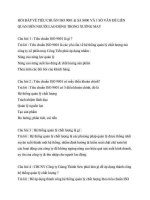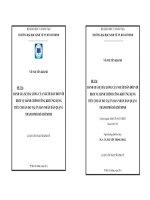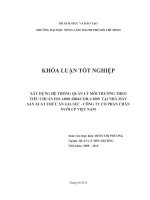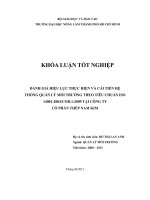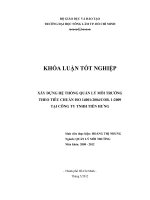Tiêu chuẩn iso 00594 1 1986 scan
Bạn đang xem bản rút gọn của tài liệu. Xem và tải ngay bản đầy đủ của tài liệu tại đây (1.09 MB, 12 trang )
International Standard
INTERNATIONAL
ORGANIZATION
FOR STANDARDIZATIONWblEJK~YHAPO~HAR
OPTAHM3A~MR
IlO CTAH~APTkl3AL&Wl.ORGANlSATlON
INTERNATIONALE
DE NORMALISATION
Conical fittings
with a 6 % (Luer) taper for syringes,
needles and certain other medical equipment
Part 1: General requirements
Assemblages
coniques
Partie 7 : Spkifications
First edition
U DC
-
;i 6 % (her)
g&&ales
des seringues
et aiguifles
et de certains
autres appareifs
;i usage medical
-
1986-06-15
Ref.
615.473.36
Descriptors : medical equipment,
pressure tests.
syringes, hypodermic needles,
fittings,
conical clamping connections,
No.
IS0 594/l-1986
specifications,
dimensions,
(E)
tests,
Price based on 7 pages
Foreword
IS0 (the International Organization for Standardization) is a worldwide federation of
national standards bodies (IS0 member bodies). The work of preparing International
Standards is normally carried out through IS0 technical committees. Each member
body interested in a subject for which a technical committee has been established has
the right to be represented on that committee. International organizations, governmental and non-governmental, in liaison with ISO, also take part in the work.
Draft International Standards adopted by the technical committees are circulated to
the member bodies for approval before their acceptance as International Standards by
the IS0 Council. They are approved in accordance with IS0 procedures requiring at
least 75 % approval by the member bodies voting.
International Standard IS0 59411 was prepared by Technical Committee
Syringes for medical use and needles for injections.
Together with IS0 594/Z, it cancels and replaces IS0 Recommandation
which it constitutes a technical revision.
ISO/TC 84,
R 594-1967, of
Users should note that all International Standards undergo revision from time to time
and that any reference made herein to any other International Standard implies its
latest edition, unless otherwise stated.
0
International
Organization
Printed in Switzerland
--`,``,`,``,``,```,,````-`-`,,`,,`,`,,`---
for Standardization,
1986
0
INTERNATIONAL
IS0 594/l-1986
STANDARD
(E)
Conical fittings
with a 6 % (Luer) taper for syringes,
needles and certain other medical equipment
Part 1: General requirements
0
Introduction
In this revision of ISO/R 594 first published in 1967, the opportunity has been taken to incorporate test methods for gauging
and performance.
It should be noted that the annex does not form an integral part
of the standard.
IS0 594/Z deals with lock fittings.
1
Scope
and field
of application
This part of IS0 594 specifies requirements for conical fittings
with a 6 % (Luer) taper for use with hypodermic syringes and
needles and with certain other apparatus for medical use such
as transfusion and infusion sets.
It covers conical fittings made of rigid and of semi-rigid
materials and includes test methods for gauging and performance. It excludes provision for more flexible or elastomeric
materials.
Figure 1 illustrates typical male 6 % (Luer) conical fitting (“male
fitting”) and female 6 % (Luer) conical fitting (“female fitting”).
1)
NOTE - It is not practicable to define the characteristics of rigid or
semi-rigid materials with precision, but glass and metal may be considered as typical rigid materials. By contrast, many plastic materials
may be regarded as semi-rigid although the wall thickness is an important factor influencing the rigidity of a component.
2
References
IS0 59412, Conical fittings with a 6 % (Luer) taper for syringes,
needles and certa/i, other medical equipment - Part 2: Lock
fittings. 1)
IS 0 7886, Sterile hypodermic
3
syringes for single use.
Dimensions
The dimensions of male and female conical fittings shall be as
given in the table and as shown in figure 1.
A typical assembly of 6 % (Luer) conical fittings is shown in
figure 2.
The dimensions of the assembly shall be as given in the table.
At present at the stage of draft.
--`,``,`,``,``,```,,````-`-`,,`,,`,`,,`---
1
ISO!W/l-1986(E)
Dimensions in millimetres
Male 6 % (Luer) conical fitting (“male fitting”)
R 0,5 max.
chamfer
-----
~~---~~~~~
_
---w-------m---
E
R0.5 max.
Female 6 % (Luer) conical fitting (“female fitting”)
or chamfer
/
--`,``,`,``,``,```,,````-`-`,,`,,`,`,,`---
?
Figure 1 - Typical 6 % (Luer) conical fittings
(see the corresponding values in the table)
I
--B-B-v-
------.--a
-Female
Male fitting 1
Figure 2 -
Typical assembly of 6 % (Luer) conical
(see the corresponding values in the table)
fittings
fitting
Iso 594/l-1986(El
Table -
Dimensions
of 6 % (Luer) conical
fittings
Dimensions
Designation
Reference
Basic
dimensions
d
D
Minimum diameter of the end of the male conical fitting (reference diameter)
3,925
3,925
max.
Maximum diameter at the end of the male conical fitting
3,990
4,027
min.
Minimum diameter at the opening of the female conical fitting
4,270
4,270
Maximum diameter at the opening of the female conical fitting
4,315
4,315
Minimum length of the male conical fitting
7,500
7,500
{ max.
F
Minimum depth of the female conical fitting
7,500
7,500
L”
Minimum length of engagement
4,665
4,050
Ad*
Tolerance for length of engagement
of the female conical fitting
0,750
0,750
N”
Tolerance for length of engagement
of the male conical fitting
R** max.
*
Radius of curvature
Or equivalent entry chamfer without any sharp corners.
4
Requirements
Gauging
4.3
4.1.1 The small end of the male conical fitting shall lie between
the two limit planes of the gauge and the larger end of the tapered
portion shall extend beyond the datum plane of the gauge.
4.1.2 The plane of the maximum diameter at the opening of
the female conical fitting shall lie between the two limit planes
of the gauge.
Rocking shall not be evident between the gauge and the fitting
made of rigid’) material undergoing test.
Liquid
Air leakage
Continued formation of air bubbles shall not be evident under
the test conditions described in 5.3. Bubbles formed during the
first 5 s shall be ignored.
4.4
Rocking shall not be evident between the gauge and the fitting
made of rigid’) material undergoing test.
Separation
force
The conical fitting under test shall remain attached to the test
fixture, under the test conditions described in 5.4.
4.5
Stress cracking
There shall be no evidence of stress cracking of the conical fitting, under the test conditions described in 5.5.
leakage
There shall be no leakage sufficient to form a falling drop of
water under the test conditions described in 5.2.
1)
1,700
0,5
The axis of the conical fitting under test shall be horizontal.
When tested in accordance with 511, the conical fitting shall
satisfy the requirements specified in 4.1.1 and 4.12.
4.2
1,083
0,5
Dimensions L, IM and N are derived from the basic dimensions.
**
4.1
semi-rigid
material
min.
E
Other
dimensions
(mm)
rigid
material
NOTE - Materials used for conical fittings should be resistant to stress
cracking in environments likely to be encountered in use (for example
when in contact with alcohols).
The test for freedom from rocking may be found useful for evaluating semi-rigid fittings.
--`,``,`,``,``,```,,````-`-`,,`,,`,`,,`---
3
1s0 594/l-1986
5
Test
5.1
E)
5.3.1.2 Connect the reference female fitting by means of a
leakproof joint of minimal volume to a syringe, the latter having
previously passed the test for leakage past the piston during
aspiration, in accordance with IS0 7886.
methods
Gauging
test
The procedure shall be carried out as specified in 5.1.1 to 5.1.4.
51.1
Carry out the test using steel gauges as illustrated
figure 3.
5.1.2
Carry out the test at a temperature
in
of (20 + 5) OC.
5.1.3 Prior to testing,
condition
products
made from
hygroscopic materials at (20 k 5) OC and (50 + 10) % relative
humidity for not less than 24 h. Conditioning is not required for
products made from non-hygroscopic materials.
5.3.1.3 Draw into the syringe, through the device and the
female reference fitting, a volume of recently boiled and cooled
water exceeding 25 % of the graduated capacity of the syringe.
5.3.1.4
5.3.1.5 Adjust the volume of water in the syringe to 25 % of
the graduated capacity.
5.3.1.6
5.1.4 Apply the gauge to the conical fitting with a total axial
force of 5 N, without the use of torque. Remove the axial load.
5.2 Test method for liquid leakage from
conical fitting assembly under pressure
Occlude the device below the conical fitting assembly.
5.3.1.7 With the nozzle of the syringe downwards,
the plunger to nominal capacity. Hold for 15 s.
withdraw
the
The procedure shall be carried out as specified in 5.2.1 to 5.2.6.
5.2.1 Connect the conical fitting to be tested to a steel male
or female reference fitting, the dimensions of which are in accordance with those shown in figure 4 or 5, as appropriate,
both components being dry. Assemble the components by applying an axial force of 27,5 N for 5 s whilst applying a twisting
action to a value of torque not exceeding 0,l N.m to give a
rotation not exceeding 90°.
5.2.2
Expel the air except for a small residual air bubble.
5.3.2
Female fittings
Conduct the test as for 5.3.1 but using a syringe with a steel
male reference fitting in accordance with figure 5 to mate with
the female fitting under test.
NOTE - Other test methods (e.g. involving automatic testing) may be
used if good correlation is shown with the reference test specified
above.
5.4 Test method
fitting assembly
for separation
force
of conical
Introduce water into the assembly.
5.2.3
Expel air.
The procedure shall be carried out as specified
5.4.2.
5.2.4
dry-
Ensure that the outside of the conical fitting assembly is
5.4.1
in 5.4.1 and
Assemble as for liquid leakage testing in 5.2.
5.2.5 Seal the assembly outlet and bring the internal water
pressure to an effective pressure of 300 kPa.
5.4.2 Apply an axial force of 25 N in a direction away from the
test fixture at a rate of approximately 10 N/s for a period of not
less than 10 s.
5.2.6
5.5
Maintain the pressure for 30 s.
Method
of testing
for stress cracking
NOTE - Other test methods (an example is given in the annex) may be
used if good correlation is shown with the reference test specified above.
The procedure shall be carried out as specified in 5.5.1 to 5.5.3.
5.3 Test metho d for ai r leakage i nto the conical
fitting assembly d uring aspiration
5.5.1 Connect the conical fitting to be tested to a steel male
or female reference fitting, the dimensions of which are in accordance with those shown in figure 4 or 5, as appropriate,
both components being dry. Assemble the components by applying an axial force of 27,5 N for 5 s whilst applying a twisting
action to a value of torque not exceeding 0,l N.m to give a
rotation not exceeding 90°.
5.3.1
Male fittings
The procedure shall be carried out as specified in 5.3.1.1 to 5.3.1.7.
5.3.1.1 Connect the male conical fitting to a female reference
fitting the dimensions of which are in accordance with those
shown in figure 4, both components being dry. Apply the male
fitting to the female reference fitting with an axial force of 27,5 N
for 5 s whilst applying a twisting action to a value of torque not
exceeding 0,l N-m to give a rotation not exceeding 90°.
5.5.2 For single-use hypodermic needles, leave the fittings
assembled for 24 h at (20 ,+ 5) OC.
5.5.3 For general equipment other than that described in
5.5.2, leave the fittings assembled for 48 h at (20 + 5) OC.
A
I
I
.
ad
0
+
a)
.
A3 acm
I
Reference diameter
Gauge for ‘testing rigid
male conical fittings
Female cone, taper (0,06 : I)
--`,``,`,``,``,```,,````-`-`,,`,,`,`,,`---
7
c?.
00
+
0
m
cs
Limit
planes
b
0 0‘
0
m
Figure 3 -
Datum plane
6
Y0
Limit
planes
6 % (Luer) conical
fittings
Gauge for testing semi-rigid
male conical fittings
Gauges for testing
b)
Female cone, taper (0,06 : 1)
Reference diameter
Limit
planes
I
4,315~!,005
Male cone, taper (0,06 : 1)
Reference diameter
@
c) Gauge for testing
female conical fittings
of all materials
4 -
Dimensions in millimetres
Dimensions in millimetres
7,s min.
+
---.--
0
I
m
----‘T
----
cv,
4
ris
/
Cone taper (0,06 : 1)
Figure 4 -
Reference
steel female
conical
fitting
Dimensions in millimetres
Cone taper (0,06 : 1)
Figure 5 -
Reference
steel male conical
fitting
IS0 594/l-1986
(El
Annex
Liquid
leakage
(This annex, given only as an example, does not form part of the standard.)
A.1
Specification
When testing the leakage characteristics in accordance with clause A.2, the established leakage rate shall not
This value of the leakage rate shall be considered as a criterion during a test.
A.2
Test
method
for leakage
0,005 Pa.m%.
rate
The procedure shall be carried out as follows:
Connect the conical fitting to be tested to a steel male or
those shown in figure 4 or 5, as appropriate.
reference fitting the dimensions of
Assemble the components bY applying an axial force of 27,5 N for 5 s whilst aPplYhI
ceeding 0,l N .m to give a rotation not exceeding 90°.
are in accordance with
a twisting action to a value of torque not ex-
Seal the outlet bore of the fitting under test so that it is airtight.
After connection, apply compressed air at a pressure of approximately 3 x 105 Pa to the fitting in the reference fitting through the
bore. Calculate the leakage rate, L, on the basis of the following formula :
L =
3 x 105
x vx-
P
AP
At
L
is the leakage rate, in pascals cubic metres per second;
Y
is the volume, in cubic metres, of the test specimen and the experimental
Ap
is the pressure drop, in pascals, during the test period;
At
is the test period, in seconds;
p
apparatus;
is the test pressure, in pascals.
Example: At a test pressure of 2,9 x 105 Pa (2,9 bar) and a total volume of 10 x 10-S m3 (10 ml), a pressure drop of 1 x 104 Pa
(0,l bar) is established within a period of 25 s.
L =
3 x 105
2,9 x 105
--`,``,`,``,``,```,,````-`-`,,`,,`,`,,`---
x 10 x 10-S x -
104
25
= 0,004 1 Pa.mVs
This page intentionally
--`,``,`,``,``,```,,````-`-`,,`,,`,`,,`---
left blank
This page intentionally
--`,``,`,``,``,```,,````-`-`,,`,,`,`,,`---
left blank
--`,``,`,``,``,```,,````-`-`,,`,,`,`,,`---
left blank
This page intentionally

